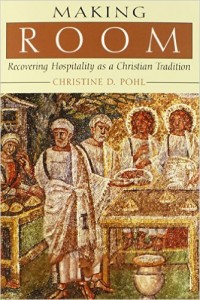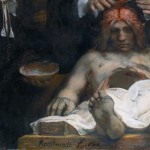
A Wall Street Journal piece by Bret Stephens, In Defense of Christendom, is unfortunately making the rounds. Cultural warriors are crying tears of joy as the pass it along blindly. The defense is an extremely superficial defense of Christian culture from a man who recently blindly blamed celibacy for the Catholic scandals. How quickly they forget!
I find it troubling that Stephens, who clearly has no qualifications to comment on complicated matters theological or historical, mixes Judaism and Christianity with things that have little or nothing to do with them:
What Europeans no longer believe in are the things from which their beliefs spring: Judaism and Christianity; liberalism and the Enlightenment; martial pride and capability; capitalism and wealth. Still less do they believe in fighting or sacrificing or paying or even arguing for these things. Having ignored and undermined their own foundations, they wonder why their house is coming apart.

The Stephens piece is really about defending the last two items on that list, capitalism, wealth, but also also macthpolitik (Let’s not forget that the radical Enlightenment put a stake through the cadaver of Post-Reformation Christianity).
The author, while complaining about Angela Merkel, shows his true cards:
Yet there she [Merkel] was in Istanbul on Sunday, offering a deal in which Europe would agree to visa-free travel for Turks in Europe starting next year, along with quicker movement on Turkish membership in the European Union, if only Ankara will do more to resettle Syrian and other refugees in their own country. Europe would also foot the bill.
This is machtpolitik in reverse, in which the chancellor is begging small favors from weaker powers on temporary matters in exchange for broad concessions with far-reaching ramifications. There are 75 million Turks, whose per capita income doesn’t match that of Panamanians. The country is led by an elected Islamist with an autocratic streak, prone to anti-Semitic outbursts, who openly supports Hamas, denies the Armenian genocide, jails journalists in record numbers, and orchestrates Soviet-style show trials against his political opponents. Turkey also has borders with Syria, Iraq and Iran. These would become Europe’s borders in the event of Turkish membership.
Machtpolitik is foreign in theory, if not always in practice, to the biblical religion and its tradition of hospitality. Merkel is actually sticking to her Christian Democratic roots by extending hospitality to foreigners. Plus, let’s be honest, Germany is the avant-garde of the coming population crash caused by capitalism. They simply need more people, irrespective of their affiliations, to keep their country running, because Germans can’t be bothered to have procreative-organic Christian sex.
Contrary to the gist of the Stephens defense, all the things the author lists as weakening once powerful Europe are much more profoundly tied to the Judeo-Christian tradition than the things he praises in the passages above:
Europe is dying because it has become morally incompetent. It isn’t that Europe stands for nothing. It’s that it stands for shallow things, shallowly. Europeans believe in human rights, tolerance, openness, peace, progress, the environment, pleasure. These beliefs are all very nice, but they are also secondary.
By rejecting these fundamental values, the defense of Christendom is actually a Nietzschean critique of the victim-mentality as not something inherently Christian. Now, Nietzsche was correct to identify Christianity as a religion of weaklings; he only didn’t see it as the positive thing it is. Whom do you see hanging above your altars? Mammon, the WSJ, or the crucified victim? If you’re having trouble with this question, then you shouldn’t comment on Christianity.
What the Christendom piece ultimately lacks, as it veers much too close to xenophobia, is an understanding of the fact that Christendom does not need to be defended. Whatever is left of Christianity in the lands of forced-conversions before the Conquistadors should live faithful and humble self-sacrificial lives. Then the words the WSJ piece quotes last will be more than tendentious proof-texting of Ratzinger’s Without Roots:
“It is commendable that the West is trying to be more open, to be more understanding of the values of outsiders, but it has lost the capacity for self-love,” a prominent German theologian noted about a decade ago. “All that it sees in its own history is the despicable and the destructive; it is no longer able to perceive what is great and pure. What Europe needs is a new self-acceptance, a self acceptance that is critical and humble, if it truly wishes to survive.”
That’s Joseph Ratzinger, better known as Benedict XVI. He’s out of fashion, which makes him that much more worth hearing.
Yes, but then in the next sentence of Without Roots Ratzinger continues by not condemning multiculturalism, but rather by planting it firmly within its Christian roots and Christian practice . . .
Click here to keep reading and see Ratzinger’s real intent.












